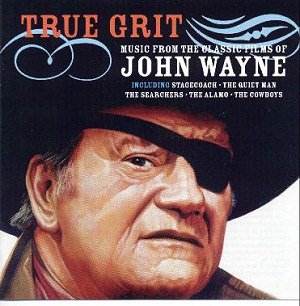Collection
True Grit Music from the Classic Films
of John Wayne
 Various
Various
 SILVA SCREEN FILMCD 725
Reissues remastered in HDCD Dolby Surround
[72:00]
SILVA SCREEN FILMCD 725
Reissues remastered in HDCD Dolby Surround
[72:00]

Considering his vast body of work, it's not surprising that John Wayne has
occasionally been blessed with some memorable musical accompaniment and here
we have a varied collection of cues from Wayne films spanning over thirty
years of cinema.
Stagecoach from 1939 features an Oscar winning score from no less
than five composers (Hageman, Harling, Leopold, Shuken and Gruenberg). At
Director John Ford's insistence the music was based on a number of American
folk melodies (such as 'I Dream of Jeanie with the Light Brown Hair'). The
suite included here in many ways is the archetypal western score, featuring
as it does so many elements that have become overly familiar and recognisable
and although it is now obviously rather dated, it's undoubtedly of great
historical importance.
The suite from the John Ford directed The Quiet Man (1952) by Victor
Young, achieves the intended provincial effect with 'The Fight' a very Irish
jig, 'Sean and Kate (Our Mother)' overtly sentimental and 'St. Patrick's
Day/Prelude to the Big Fight' light and breezy and all quite fun. Wayne's
frequent collaborator Ford was actually generally dismissive toward film
scoring. He much preferred to recycle existing music than have a composer
put a personal, more innovative stamp on his films and anyone who is familiar
with Ford's work will probably accept that (allowing for a very few exceptions)
his credits would not be the first place you would look to find a great score.
The 'Prelude' from 'The High and the Mighty' (1952) composed by
Dimitri Tiomkin, was very popular when the film was released and the main
theme is certainly a product of its time, the melodramatic, large-scale
orchestration and simplistic melody then very much in vogue. Another 'Prelude',
the big, memorable theme from How the West was Won (1962) by Alfred
Newman, has some nice symphonic flourishes, coupled with some appealing,
more pensive moments amidst the rousing spectacle. An album highlight. Paul
Anka's 'March' from The Longest Day (1962) isn't of the same calibre
though. A typically patriotic march so often heard in 60's war films, it's
a big step down from Elmer Bernstein, but in that general style.
The suite from The Searchers (1956) by the influential Max Steiner,
encapsulates in many ways the western background music through the thirties,
forties and fifties and features a rather nice, gentle Red Indian theme,
while 'Baby Elephant Walk' from Hatari (1962) is an instantly recognisable,
swinging, cheeky melody. Rock n' roll for elephants!
Dimitri Tiomkin's The Alamo (1960) opens with the appealingly nostalgic
lush strings of his 'Overture', before 'The Green Leaves of Summer' (based
on an old Russian folk tune) takes centre stage and works wonderfully well
as a lament.
The Elmer Bernstein 'Main Theme' from The Sons of Katie Elder (1965),
if we needed reminding, once again proves that he was the master of the rousing,
catchy western theme. Coming on the heels as it did of the far better known
The Magnificent Seven, it is very much in the same mould, but Bernstein
still manages to make it original enough for it to stand in its own right.
Just short of being a classic.
A suite from In Harm's Way (1965) by the estimable Jerry Goldsmith
features 'Intermezzo: The Rock and his Lady/Love Theme', a very low-key cue,
although the love theme is pleasant enough. Of far greater interest and impact
is 'The Rock/Final Victory', which is vibrant action music with all of the
now familiar Goldsmith frills, before moving into some darker territory with
dissonant brass creating an uneasy sense of tension. Another album highlight.
A bugle call opens 'Leaving the Fort' from She Wore a Yellow Ribbon
(1949) by Richard Hageman and then develops into a typically folksy theme
(a standard device used by director John Ford). Elmer Bernstein then returns
with True Grit (1969) for the segment 'Rooster and Le Boeuf/Runaway/Warm
Wrap-up'. This begins as more rollicking bravado, although with a distinctly
sentimental underbelly. The popular theme song (sung in the film by Wayne's
co-star Glen Campbell) soon becomes pervasive and features throughout. Personally
I would have preferred to have heard more of the dynamic action music.
Finally 'The Cowboys' (1972) gave John Williams his crack at a full blown
western score and he came up trumps with his 'Overture'. This long piece
(at over nine minutes) moves from robust and lively to dramatic and emotional
and is a fine way to conclude the CD.
Capably performed by The City of Prague Philharmonic conducted by Paul Bateman,
this is a mixed bag to say the least. And while I'm not at all certain that
it's really the best compilation to gain the few notable tracks it offers,
generally speaking it's fairly entertaining. For Wayne fans in particular
a pleasant walk down memory lane.
Mark Hockley

![]()
![]()
![]()
![]()
![]()
![]()
![]()
![]()
![]()
![]()
![]()
![]()
![]()
![]()
![]()
![]()